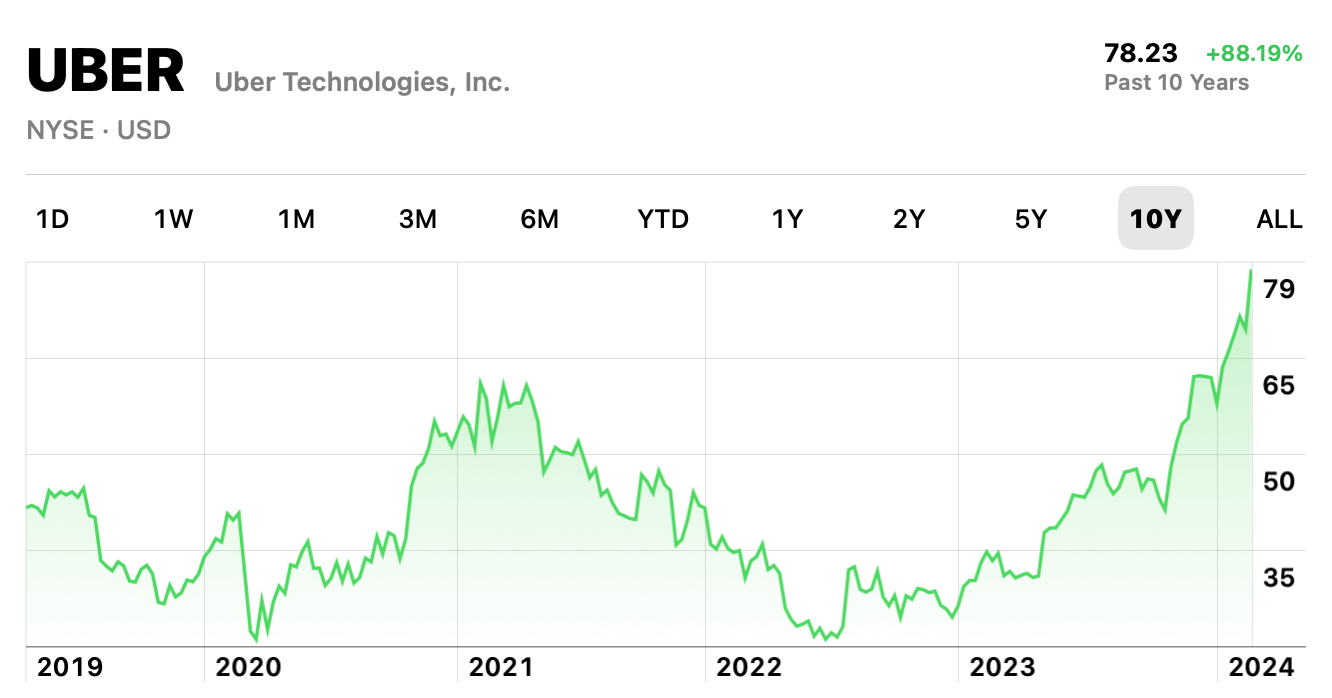Uber Wasn't Worth $17B. True. It's More Like $150B. And Rising.

One thing I've done for well over a decade: bookmark posts and takes that I find ridiculous for various reasons – or those which I think are likely to look foolish, in hindsight. I have many of these. As the kids say, I keep the receipts.1
The above is a fun one to revist today, as Uber's stock just surged 10+% on the news that they're doing a $7B share buyback. But this is also tied to their strong recent earnings, which made all of those folks who joked that Uber would never turn a profit – and there were many of them – look dumb. Uber isn't just profitable now. It's very profitable. Hence the buyback. Hence joining the S&P 500.
Hence a market cap now well north of $150B.
That milestone valuation reminded me of this post by Aswath Damodaran, a finance professor at New York University’s Stern School of Business. The year was 2014 – ten years ago. Uber had just raised private financing at a $17B valuation, hence the title of Damodaran's post.
To be clear, I was incredibly biased on this topic. The year prior, I had joined GV (née Google Ventures) which had led a $250M+ round into the company. It was such a large amount that it would probably be fair to say that we were betting the fund on it, at the time. The money valued to company around $3.8B – so of course the $17B mark a year later looked great to us (on paper)! While Uber is long since public, I still hold shares. Anyway, all of this is why I kept said receipts!
In his post, Damodaran makes a case for why such a valuation is ridiculous when considered the way that a professor of finance may consider it.
For my base case valuation, I’m going to assume that the primary market Uber is targeting is the global taxi and car-service market. I know that there is talk (some from Uber’s management and analysts) that Uber could extend its reach into other businesses such as car rentals, moving services and even driverless cars, but I don’t see evidence that it has succeeded in making any breakthroughs yet.
What's interesting there is that in Damodaran's pie-in-the-sky bull case made by others, Uber actually tried to break into each of these markets, and then pulled back. So that's not what led to where we are today.
You can see the end results of these assumptions and explore the data in this Excel file, but the narrative is a simple one. Uber not only becomes the largest and most profitable player in the car-service business, it also plays a role in expanding that business. It retains a strong competitive edge, allowing it to generate much higher profit margins than the competition, while becoming a safer investment over time. I estimate Uber’s risk-adjusted value to be $5.9 billion.
To be fair, this was a decade ago. To be less fair: yikes. My favorite part of his chart is that the upper-bounds for valuation is $34.9B.
And yet, he almost gets there in the end:
This framework lends itself easily to other narratives. For instance, one of the more optimistic takes says that Uber is in the logistics market, i.e. it’s a player in any business that involves moving people or things from one point to another. That would lead you to define Uber’s market more broadly and come up with a much higher valuation. As you consider these possibilities, though, it’s worth keeping in mind that investing is not a game of possibilities but one of probabilities.
Logistics, in the form of Uber Eats, clearly helped the company break such frameworks – especially when the world was locked down in COVID times. But the 10,000 foot reality remains as it was a decade ago: Uber completely changed the world. That's not hyperbole, it's a fact. You can now travel to any number of cities in the world and be able to get around without needing to rent a car. Or pray that a taxi shows up. You can even live in various cities now without needing a car, depending on your situation. A reasonable solution for many instance of drunken driving. A way to send babysitters home at night. On the flip side, it ignited an entire economy for individuals who valued flexibility and push-button (quite literally) work on the fly. And on and on...
The list of Uber’s investors includes some of the biggest names in venture capital, and you may be tempted to conclude that given their pedigree, they must know something we don’t. You may be right, but I wouldn’t be that quick to conclude that smart investors always make smart investment judgments.
Easy to take a victory lap in hindsight, of course. I obviously did nothing here. Well, beyond keeping those receipts and shares.

In general, I'm a longtime fan of this genre:

1 I have no idea if kids actually say this. I assume not. Maybe kids who want to grow up to be accountants? The Urban Dictionary entry is a few years old. It may have actually risen into pop culture via Whitney Houston?!


